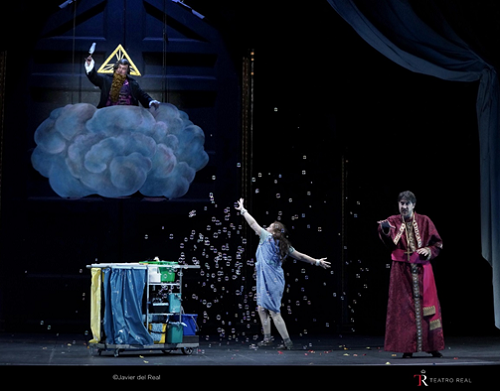 Spain Rossini, La Cenerentola: Chorus and Orchestra of the Teatro Real / Riccardo Frizza (conductor). Teatro Real, Madrid, 24 & 25.9.2021. (JMI)
Spain Rossini, La Cenerentola: Chorus and Orchestra of the Teatro Real / Riccardo Frizza (conductor). Teatro Real, Madrid, 24 & 25.9.2021. (JMI)

Production:
Director – Stefan Herheim
Sets – Stefan Herheim & Daniel Unger
Costumes – Esther Bialas
Lighting – Andreas Hofer
Casts:
Angelina – Karine Deshayes/Aigul Akhmetshina
Don Ramiro – Dmitry Korchak/Michele Angelini
Don Magnifico – Renato Girolami/Nicola Alaimo
Dandini – Florian Sempey/Borja Quiza
Alidoro – Roberto Tagliavini/Riccardo Fassi
Clorinda – Rocío Pérez/Natalia Labourdette
Tisbe – Carol Garcia
Teatro Real began its 2021-2022 opera season with this popular Rossini title, which is returning to Madrid after an absence of 20 years. Hopefully, this new season will also be a more normal one after the previous year when the pandemic hurt programs in every theater.
This marks the opening of the hundredth opera season at Teatro Real, and the performances of La Cenerentola are dedicated to the unforgettable Teresa Berganza, a Rossini singer emerita and an Angelina to remember.
Opera houses tend to give great importance to the season’s start with major stars in lead roles, but that does not seem to me to have been the case here. It is also usual for the season opening to commission new productions, but this staging comes from Den Norske Opera and Opéra National de Lyon (Oslo and Lyon respectively). It premiered in the Norwegian capital in 2017 and could later be seen in Lyon and at the Edinburgh Festival.
Stefan Herheim is the director, and I do not remember having seen his productions before in Madrid. This one seems to be a tribute to the French director Jean-Pierre Ponnelle – at the beginning of the opera, they coincide in their approach. During the overture, a young woman is sweeping the stage, when Rossini, who is preparing his new opera, appears and decides to do La Cenerentola with the girl as the protagonist. Rossini himself will assume the character of Don Magnifico.
The production is extremely lively with sets that allow for rapid changes, which means lots of movement on the stage (although not all the movement of chorus and extras is convincing). The scene that closes Act I, where the main characters sit at the table for supper, is well achieved and very funny. Overall, it is a strong production that is at the service of the plot. The costumes are traditional ones from the Perrault tale.
The musical direction was under Riccardo Frizza, whose career is closely linked to Rossini, a composer he conducted regularly when he was the usual conductor for Juan Diego Flórez. His reading gave life to the music and showed a true Rossinian sense, and he drew a remarkable performance from the Teatro Real orchestra.
Cenerentola was sung by mezzo-soprano Karine Deshayes in the first cast. She was a convincing performer but not exceptional. It has been almost 18 years since I first saw her in this role, and then she seemed a decent singer with a rather small voice and quite weak at the bottom. There is no doubt that she has gained amplitude in the middle range, although she is still weak in the low notes.
Mezzo-soprano Aigul Akhmetshina in the second cast was making her debut at Teatro Real. For my taste she was the strongest of the second cast: she has an appealing, well-managed voice with sufficient amplitude and the coloratura held no fears for her. She can have an important career.
The first Ramiro was Dmitry Korchak: a light tenor with a pleasant voice, who has no problem with coloratura or the highest notes. It was a fine interpretation, particularly in his brilliant aria of the second act. Michele Angelini in the second cast did well; he is a light tenor who had some trouble with his top notes.
As Don Magnifico, baritone Renato Girolami moved well on stage, but his voice was not remarkable. In the second cast we had Nicola Alaimo, who does not usually sing this type of buffo character.
Dandini was sung first by baritone Florian Sempey. His voice is well-suited to the part, with an attractive timbre. Borja Quiza in the second cast was too light for Dandini but a good interpreter.
Bass Roberto Tagliavini as Alidoro did nicely: his voice has gained in volume and today he is an outstanding singer in the role. In the second cast, Alidoro was sung by Riccardo Fassi, from whom I was expecting more.
As the stepsisters, soprano Rocío Pérez in the part of Clorinda made a favorable impression; the part was sung by Natalia Labourdette in the second cast. They were joined by Carol García in the part of Tisbe.
José M. Irurzun